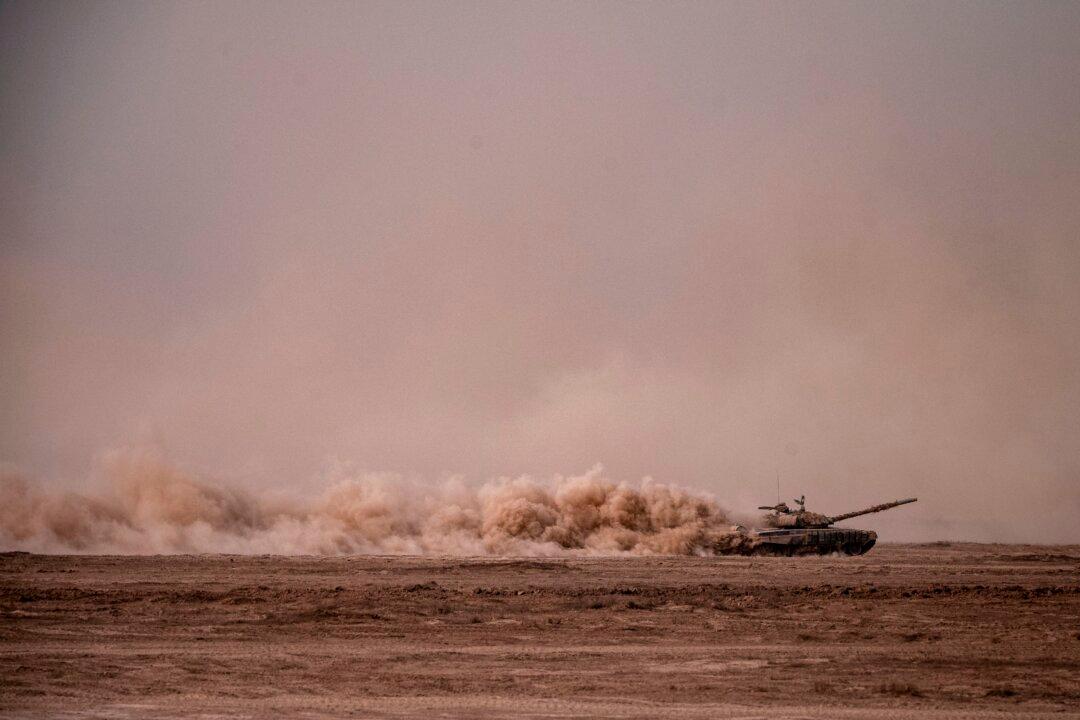Commentary
Chinese troops have been training in the Eastern European country of Belarus, according to the Belarusian regime. Supposedly, the People’s Liberation Army is there to engage in joint counter-terrorism training, which began on July 8 and will conclude on July 19. But the Belarusian city of Brest, where they are training, is on the border with Poland, a NATO alliance member.
Beijing’s choice of training partner is odd, just as Russia is threatening nuclear war against NATO for its support of Ukraine. Belarus allows Russia to base nuclear weapons and engage in joint nuclear training with Russia. The China–Belarus training was scheduled for just a few days after Belarus joined the Shanghai Cooperation Organization (SCO), which is reasonably described as an anti-U.S. alliance and includes authoritarian countries such as China, Russia, and Iran.
At its most recent meeting in Kazakhstan on July 3, the SCO emphasized not only its original counter-terrorism mission, but also “countering any domestic instability,” according to Reuters. That’s bad news for civil society in countries that want to promote democracy and human rights. Any SCO member that has too many pro-democracy protesters can ask the Chinese Communist Party (CCP) for technical assistance in finding and executing dissidents of any type. Leave it to the experts of Tiananmen Square to fix a democracy problem, whether they want more freedom of speech, religion, or at the ballot box. The CCP is anti-freedom and always looking for more international influence and opportunities to spy electronically, so it should be happy to oblige.
The supposed counter-terrorism mission of the SCO is a bit rich, given that Beijing supports Russian President Vladimir Putin and his subordinate ally, Belarusian President Alexander Lukashenko. On July 8, Moscow bombed targets across Ukraine, including the country’s largest children’s hospital in Kyiv. In total, at least 31 people died.
Unfortunately, Hungary is involved. It is supposedly a NATO ally, but its leader, Viktor Orban, popped up in Beijing on July 7. He was there to promise deeper relations between the two countries. Two days earlier, Mr. Orban met with Mr. Putin in Moscow. Both visits were secretly planned and in opposition to NATO’s attempt to establish a united bargaining position against the world’s worst threats, led by the CCP. Communist China and its allies attempt to use Mr. Orban’s veto in NATO and the European Union for their own purposes.
At least NATO is finally waking up to the risk from the CCP, despite it being “so far away” in Belarus. In fact, ever since the CCP first deployed its three-stage DF-31 intercontinental ballistic missile in 2006, all of Europe was within range of its nuclear weapons. Beijing is in full support of Moscow, despite Mr. Putin’s nuclear threats against both Europe and the United States. Now, China is joining forces with Russia right at NATO’s doorstep. The gloves are off; the mask is thrown away.
NATO denounces the CCP’s support for Russia’s war. The regime in Beijing buys Russian oil and gas and sells weapons components to Russia for the missiles raining down on innocents in Ukraine.
Mr. Orban is engaging with communist China far too closely. For “realists” such as Mr. Orban, all countries are the same regardless of their political system. They just follow their “national interests.” However, this ignores history, science, and the most basic principles of friendship as applied to nations.
Dictators maximize their chances of staying in power by brutally suppressing their population and by maintaining high levels of military tension with neighbors. They use this tension to cause a “rally-round-the-flag” effect in which nationalism, with the dictator representing its epitome as the nation, is stabilized at the top. So much the better for that dictator if he can make that nation bigger through territorial gains at his neighbor’s expense.
Democracies are completely different. We value the idea that good fences make good neighbors. The democratic free press and voters punish leaders who go to war and hurt trade for no good reason. Democracies are slow to anger, but once provoked, they are fiercer and more committed to the fight than dictatorships. Treating democracies and autocracies as the same kind of country, and equally worthy of our friendship, trade, and alliance commitments, is the fatal mistake we made in boosting trade with China since the 1970s. Now, it is coming back to haunt us in the form of CCP soldiers at our doorstep.
The “no limits” alliance between Xi Jinping, Vladimir Putin, and now possibly Alexander Lukashenko is a risk to the West—and should be getting more attention.





